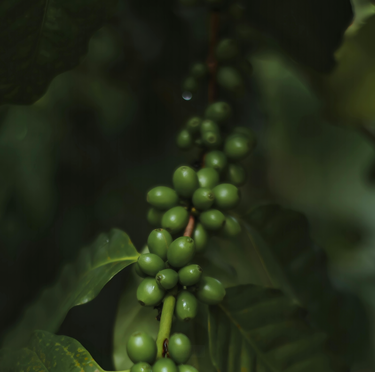Arabica coffee, scientifically known as Coffea arabica, is one of the most beloved and sought-after coffee species in the world. It is renowned for its superior quality, complex flavours, and rich history. But what exactly makes it so special? Let's delve into the world of Arabica coffee and discover its unique characteristics.
At Rave Coffee, almost all of our coffee is roasted using Arabica beans that have been scored at 82 points or more for a high-quality and special taste. (Coffee’s that score 80 or above on the SCA scale are classified as ‘speciality’)
Arabica Coffees Superior Taste
Arabica coffee is renowned for its exquisite flavour, which is frequently described as sweeter and softer than other coffee species. It has a diverse set of flavours and aromas, ranging from fruity and chocolatey to nutty undertones. This complex flavour profile distinguishes Arabica coffee and contributes to its premium status.
Arabica Coffee's Distinctive Growing Conditions
Arabica coffee plants are extremely fragile and require specific growing conditions. They thrive at high altitudes, often between 1,800 and 6,300 metres, with rich soil and a stable climate with temperatures ranging from 15 to 24 degrees Celsius.
These stringent requirements make Arabica coffee cultivation more difficult than other species, but they also contribute to the coffee's distinct flavour. The higher the altitude, the slower the plant grows, giving the coffee cherries more time to develop, resulting in a denser, more flavorful bean.
The Distinctive Features of Arabica Coffee Beans
Arabica coffee beans are distinct in their appearance. They are typically oval-shaped and slightly curved, unlike the rounder and smaller beans of other coffee species. The beans are also generally larger, which is often associated with higher quality coffee. This distinctive shape is one of the identifying features of Arabica coffee.
The Caffeine Content in Arabica Coffee
Interestingly, Arabica coffee contains less caffeine than other coffee species, such as Robusta. While caffeine content can vary depending on various factors, Arabica beans generally contain almost half the caffeine of Robusta beans. This lower caffeine content is believed to contribute to Arabica's smoother and less bitter taste, making it more enjoyable for many coffee drinkers.
The Rich History of Arabica Coffee
The history of Arabica coffee is as rich and complex as its flavour. Believed to have originated in the highlands of Ethiopia, it was first cultivated on a large scale in the Arabian Peninsula, hence the name "Arabica". Over the centuries, Arabica coffee has spread across the globe, becoming the most widely grown and loved coffee species in the world.
The Complex Flavours of Arabica Coffee
Arabica coffee is known for its complex flavour profile. Depending on the specific variety and where it's grown, Arabica coffee can exhibit a range of flavours. Some varieties might have a pronounced fruity or floral taste, while others might have a more pronounced chocolatey or nutty flavour. This complexity and diversity of flavours make each cup of Arabica coffee a unique experience.
The Consistency of Arabica Coffee Flavour
One of the reasons why Arabica coffee is so highly valued is its consistency in flavour. Arabica coffee plants are self-pollinating, which means the beans have a consistent flavour. This consistency is crucial in ensuring the quality of the coffee, as it allows coffee growers to produce a uniform product that meets the high standards of the specialty coffee industry.
The Arabica Coffee Varieties
There are numerous Arabica coffee varieties, each with its own distinct characteristics. Typica, Bourbon, and Geisha are a few well-known varieties. Each of these varieties has a distinct flavour profile, growth habits, and disease resistance. This variety enriches the Arabica coffee experience by providing a world of flavours to discover and enjoy.
Arabica Coffee's Labor-Intensive Cultivation and Processing
Arabica coffee cultivation and processing necessitate a significant amount of manual labour. Each step, from picking the cherries by hand to sorting the beans, is meticulously carried out to ensure the highest quality.
This labour-intensive process, combined with the plant's specific growing requirements, contributes to Arabica coffee's higher price. However, it is a price that many coffee lovers are willing to pay for Arabica coffee's superior taste and quality.
Conclusion
In conclusion, Arabica coffee is special for a multitude of reasons. Its superior taste, unique growing conditions, distinctive beans, lower caffeine content, rich history, complex flavours, consistent flavour profile, diverse varieties, and labour-intensive cultivation and processing all contribute to its status as a premium coffee.
Whether you're a coffee connoisseur or a casual coffee drinker, the world of Arabica coffee offers a fascinating journey of discovery and enjoyment.
By sourcing ethically produced Arabica coffee, consumers can enjoy their daily cup of java knowing they’re doing their part to support responsible businesses around the world while still getting a great-tasting product at the same time!
Our 1% for the Planet scheme means every time you purchase a coffee, you’ll be giving back to the planet. 1% of all earnings made by Rave Coffee are donated to environmental causes. Take part in the Rave Coffee Quiz to discover your perfect coffee in less than a minute!






